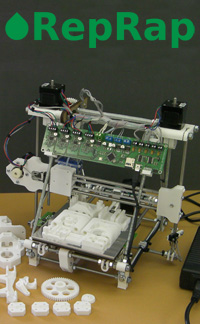Past Events
How useful are animal models in understanding the molecular and cellular mechanisms that underlie addiction?
|
As a warmup for the Royal Society Summer Science Exhibition we have invited one of the teams from the event to tell us about their work.
Dr Matt Parker of Queen Mary, University of London will talk about how studying the impulsive nature of zebrafish can tell us about the cycle of addiction, specifically, the move from occasional drug use to habitual and compulsive drug seeking, withdrawal and relapse. Dr Parker will discuss some of the difficulties associated with treatment, and how understanding more about the genetics and early markers of addiction may help to develop more effective treatments and even prophylactic interventions. |
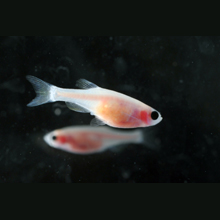
|
Date: Wednesday 26th June 2013
Time: 7pm, for a 7.30pm start
Place: Upstairs at The Lamb, 92 Lambs Conduit Street, WC1N 3LZ [gmap]
Cost: Free
You can learn more about the Zebrafish Neurobiology and Behavioural Genetics Group’s work and their exhibit at http://zebrafish-genetics.tumblr.com/
| Hard to believe, but we once considered heroin a suitable cough suppressant for children, and tapeworms a miracle diet aid! Join us for a tour through the Public Health film archives to find out what health advice was REALLY like in mid-20th century Britain, and just how far we have come in our understanding of disease prevention and treatment.
We will be showing a series of public health films shown from 1942-1968, looking at issues ranging from obesity and smoking to vaccinations. Alongside the films, our panel of medical researchers and science historians will be discussing just how much has changed, helping us to sift the fact from the fiction, and the daft from the downright dangerous. Date: Wednesday 12th June 2012 |
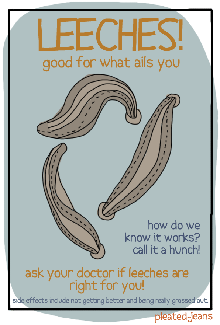 |
All films have kindly been provided by the Wellcome Trust and the BFI.
There will be a cash bar on site.
Read the rest of this entry »
Click here to leave a comment about this event
The Dating Games: Can you guess who’s who?
We’re back for April but we’re not taking you for fools!
We are seeking 15 guys and 15 girls who are attracted to the opposite gender and single to come and participate in our speed dating game. So if you are open-minded, up for a laugh, looking for someone special and curious to learn about the science behind the dating game then this is the night for you!
| Introduction When you arrive you’ll be greeted by one of the cheerful Science London crew, they’ll hand you a drink to help calm any nerves (we’re so good to you). Then once everyone has arrived we’ll be breaking the ice with our resident funny man Dr Steve Cross (co-creator of Science Showoff and Bright Club). He’ll paint a smile on your mouth and shoot an arrow through your heart. We thought we’d shake things up a bit and let you grill the expert before you attempt to woo one another. This time we have Dr. Nathan Oesch who will be telling us about the nature of human courtship and how the dating mind works. Don’t be afraid to ask him your questions, after all it could be the difference between having a quick fumble or finding a meaningful connection with someone… guess it depends on your aim for the night. Method |
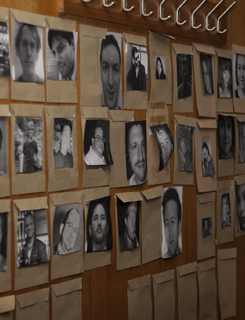
|
From Beer to Biscuits, the maths of food
|
Maths is often thought of as a dry subject, far removed from reality. However, this is far from the case, and in fact maths is very important in food! In this talk Prof. Chris Budd from the University of Bath will talk about some of the maths needed to make beer, how maths can help you cook the perfect potato and why maths is vital to the biscuit business.
So please come along, and drink some beer or eat a potato. |
 Biscuit perspective by Peter & Maggie |
Date: Monday 22nd April 2013
Time: 7pm, for a 7.30pm start
Place: Upstairs at The Lamb, 92 Lambs Conduit Street, WC1N 3LZ [gmap]
Cost: Free
Poster for this event for you to print out and hang up in your place of work/study!
|
Klaus Dodds will addresses the current controversies surrounding the present and future management of the Arctic region – at their heart lies a predicament about how to make sense of the Arctic as a highly dynamic, inhabited, resource-rich and increasingly accessible space.
Klaus Dodds is Profesor of Geopolitics at Royal Holloway, University of London and author of many books on geopolitics, security and the Polar Regions. He is a frequent visitor to the Arctic region and worked in Alaska, the Canadian Arctic, Greenland, Iceland and the Nordic Arctic. Date: Wednesday 27th February 2013 |

|
The Dating Games: Sniffing out a Soulmate
This is now SOLD OUT but we still have tickets for the After Party (starts at 9pm) so you still have a chance to find the love of your life the 15th with your friends Science London. You can get your ticket for £5 from EventBrite
It’s back! Bigger, better and ready to tackle Valentines Day!
We are seeking 20 guys and 20 girls who are attracted to the opposite gender and single to come and participate in our new speed dating game. So if you are open-minded, up for a laugh, looking for someone special and curious to learn about the science behind the dating game then what are you waiting for? This is the night for you!
| Introduction When you arrive you’ll be greeted by one of the cheerful Science London crew, they’ll hand you a drink to help calm any nerves (we’re so good to you). Then once everyone has arrived we’ll be breaking the ice with a short burst of humour from the love guru that is Dr Steve Cross (co-creator of Science Showoff and Bright Club). No one can tickle that funny bone quite like he can. Method Now, we were thinking we could line you all up and get you to sniff one another (very amusing for us to watch), but we figured you’d all be doused in perfume and aftershave so therefore, to help your natural scent stand out we will be sending you all t-shirts to sleep in for the two nights before the games. And when you arrive we’ll collect these t-shirts in and place them into sealed bags for our first round… |
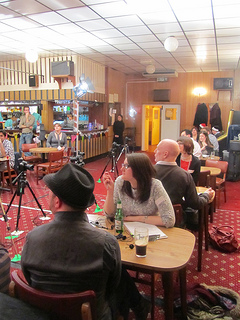 |
Building robots for fun and profit
|
Shadow is an unusual robotics company, founded as a group of amateurs wanting to develop robots that they thought no-one else was developing, and evolving into one of the world’s leading robotics engineering firms. On the way they’ve engaged with, and built robots for, everyone from the space community to the extreme end of the performing arts community.
Rich Walker is the Managing Director, a typical engineer/cat-herding role, having joined in the fun 20 years ago, because he wanted to write AI software. Rich was then told “we have to build the robots before we can write software for them”, and handed the wrong end of a soldering iron. He still wants to write AI software one day, but currently sets up European research projects, plans long-term roadmaps for the robotics community, and finds new and interesting things for the Shadow team to engage in. |
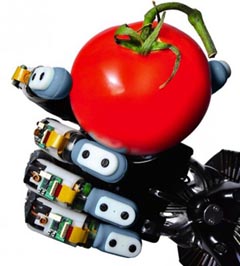
|
Rich will talk about what robotics is about, where it could go, and some of the interesting problems in the domain.
Date: Wednesday 27th March 2013
Time: 7pm, for a 7.30pm start
Place: Upstairs at The Lamb, 92 Lambs Conduit Street, WC1N 3LZ [gmap]
Cost: Free
Poster for this event for you to print out and hang up in your place of work/study!
Click here to leave a comment about this event
A world where anyone can make anything
Adrian Bowyer holds a first degree and a PhD in engineering from Imperial College. He was an academic at the University of Bath for 35 years, retiring from academic life in 2012 to help to run the company RepRap Professional Ltd. His areas of research are geometric modelling and geometric computing in general, the application of computers to manufacturing, and biomimetics.
Date: Wednesday 30th January 2013
Time: 7pm, for a 7.30pm start
Place: Upstairs at The Lamb, 92 Lambs Conduit Street, WC1N 3LZ [gmap]
Cost: Free
Click here to leave a comment about this event
The 1,000 mph engineering adventure
|
The BLOODHOUND Supersonic Car, launched by Richard Noble and Andy Green in October 2008 is set to take the land speed record into a whole new speed regime. The team, including researchers from Swansea University at its heart, plans to take a manned vehicle to 1000mph, increasing the current land speed record (763mph) by over 30%.
The target presents the team with massive scientific and engineering challenges, not least of which being how the car will stay attached to the ground at these speeds. The CFD (computational fluid dynamics) research team at The College of Engineering at Swansea University has been working on answering such questions, and predicting the overall aerodynamic behaviour of such a vehicle. The BLOODHOUND project is currently entering the build phase with vehicle completion expected in mid-2013. The car is then due to be tested in 2013 in an attempt to increase the World Land Speed Record from 763 mph to 1,000 mph. Dr Ben Evans from the BLOODHOUND team will answer both the how and the why questions related to this iconic project. |
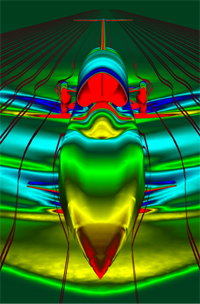
|
Ben studied for a PhD in Computational Fluid Dynamics at Swansea University, which led to his post-doctoral research on the development of unstructured mesh techniques for high speed flows with particular application to the BLOODHOUND supersonic car. He is currently employed as a lecturer in Aerospace Engineering in Swansea University’s College of Engineering and remains a member of the BLOODHOUND SSC design team.
Date: Wednesday 9th January 2013
Time: 7pm, for a 7.30pm start
Place: Upstairs at The Lamb, 92 Lambs Conduit Street, WC1N 3LZ [gmap]
Cost: Free
The Dating Games: Unlocking the Secrets of Body Language
We’re back again with a new experiment and a Christmas party!
Since July nearly 100 single Londoners have taken part in the Science London Dating Games. We have had a lot of fun, collected some good data, found two scientifically matched pairs and encouraged many more phone numbers to be swapped at the bar afterwards! Now, for Christmas we have decided to mix it up a bit, change the rules, put up some mistletoe and look at another aspect of dating… body language!
We are seeking 15 guys and 15 girls who are straight and single to come and participate in this new speed dating experiment. So if you are open-minded, up for a laugh, looking for someone special and curious to learn about the science behind the dating game then what are you waiting for? This is the night for you!
|
Introduction When you arrive you’ll be greeted by one of the cheerful Science London crew and handed a drink to help calm any nerves (we’re so good to you). Once everyone has arrived we’ll be breaking the ice with a short burst of humour from the love guru that is Dr Steve Cross (co-creator of Science Showoff and Bright Club). Ask anyone who is anyone and they’ll tell you he was FANTASTIC at the games in October so we are lucky to have him back! Method |
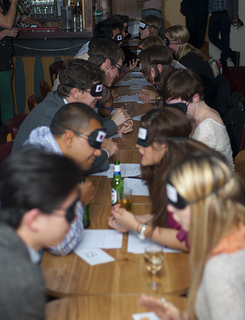 There’ll be no blindfolds this time! There’ll be no blindfolds this time!
|
You will be asked to take a seat opposite your first potential love match and then we’ll begin. After 3 minutes of chatter you’ll then have sixty seconds to rate them before we ask you to say your goodbyes and move on. After you have ogled and chatted to everyone you’ll hand in your scorecards to our behind-the-scene experts who will examine the data.
Discussion
Whilst we are crunching the numbers you’ll hear about the best types of flirting from Dr. Harry Witchel, a psychobiologist who knows all the moves that makes men and women attract one another. He knows how to make your body language speak like a native.
Results
The Science London data team will then report back to announce any successful matches. Should we find a couple (or couples) who have flirted their way to high scores we will foot the bill for their first date.
Conclusion
Will this novel dating approach help us to find true love? Honestly, we do not know. We had a LOVELY matched couple in October! We have high hopes for them…
**AFTER PARTY**
We think it is a shame that we can only invite 30 singletons to come and play in this game. The last two Dating Games have sold out within weeks and we hate turning people away so why not come and join us for a frolicking festive after party? We will be cranking up the music, propping up the bar and could be playing some scientifically themed games… At only a fiver you can’t go wrong surely? Entry to the after party is included in the full Dating Games entry so if you’re dating no need to buy an after party ticket.
Note: An after party ticket only allows you to entry after 9pm, once the dating portion has ended.
When you purchase a ticket to the dtaing portion of this event you will be asked to complete a short personality profile and submit a headshot of yourself. This information is needed before the date night so please be sure to send it to us by 1 December
Also please note that when you sign up to this event you will also be participating in a real experiment into the science of dating. There will be journalists at this event who may wish to talk to you about your experience; you will have the option to share your information or decline.
Date: Wednesday 5th of December 2012
Time: Doors open at 7pm (dates starting promptly at 7:30pm)
Place: Bethnal Green Working Men’s Club, 42-46 Pollard Row, London, E2 6NB [gmap]
Cost:
Dating Games – £8 (including a drink on arrival and entry to the after party)
After Party – £5 (doors from 9pm)
Both tickets can be bought from Event Brite or using the form below.
Please note when buying your ticket we have had to separate sales by gender to ensure a 50/50 split so make sure you pick the right ticket. We will not issue refunds for buying the wrong type of ticket.
« Previous Entries Next Page »
This site is powered by WordPress.
Science London was part of the British Science Association

